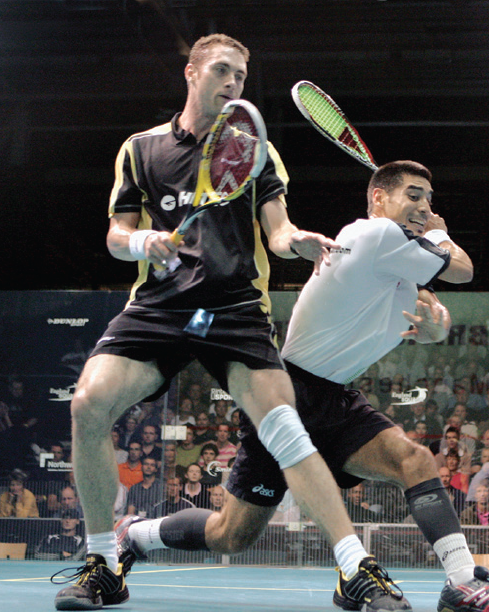By Barry Faguy, WSF Referees and Rules Committee
Here’s the third in a short series of short articles dealing with what can be called ‘conventions’—used here in the sense of ‘understandings’ where we don’t necessarily follow the letter of the law. You can re-read the full intro in the original article—but for now, let’s go to the third one, about the common expression known as: Every Effort
Interference is commonplace, and as was suggested in a previous article, any legitimate interference must pretty much be the fault of the non-striker (who either didn’t clear fast enough, or clear in the right direction). If that’s all we needed to know, then it wouldn’t be unreasonable to award a stroke to the striker each time there’s an appeal for actual interference. But that wouldn’t make for a very playable game, would it?
Making the game playable
To avoid that abusive approach, the rules contain a few ‘tools’ that together make up a screening process of sorts, to help you sort out the mess and come up with fair, rules-based decisions. The consideration of the effort that the players make is one of those very helpful tools. However, if the word ‘effort’ is going to be of any use, it can’t just stand alone as a sole word—otherwise there could be no consistency among referees. It needs to be characterized, and ‘every’ is the familiar characterization that is meant to be applied.

Where is it applied?
In practical terms, we’re mostly talking here about the ‘access’ and ‘swing’ forms of interference (not so much to the view, or to the path of the ball). So, as far as the non-striker (causing the interference) is concerned, once an appeal is made, you need to decide if he or she was making every effort in terms of clearing away to allow the striker in. This is the area where most people instinctively apply the ‘every effort’ criterion. We mustn’t forget, however, about the striker (who encounters the interference). Here, you need to determine if indeed he or she was making every effort to get to and play the ball. (And yes, sometimes both the non-striker and striker fail in their responsibilities—but that’s another debate.)
So, those are the rules and standards. Do they happen in real life? I’m afraid not.
The ‘every effort’ convention
The definition of ‘every’, by any standard dictionary, leaves no room for anything short of a great effort—“all possible” or “without exception.” It’s tempting to conclude that the rules-writers were just kidding many years ago when they came up with that word as the required standard— simply because it’s quite impractical.
It’s true that occasionally (usually when a player is in a bad spot), we do indeed witness ‘every’ effort, but generally its short-coming as a standard is particularly and routinely noticeable with the non-striker’s effort to clear. We often barely see any— since the non-striker is clearly expecting that the striker should just “go around.” That’s not to say that the striker is any more sporting, since we frequently see appeals for what is marginal interference—particularly when faced with a tough return.
Given this unrealistic standard, ‘every effort’ has come to be understood by both referees and players, as ‘any effort’ or ‘some effort’. If you doubt that, watch some live matches or videos and pay attention to those clearing efforts in particular.
Dealing with the convention
It’s clear that ‘every effort’ is simply the wrong wording—but it’s also clear that something more realistic is not forthcoming, nor is the convention of ignoring it about to be abandoned. So, common sense says you need to accept some other wording to set your standards for decision-making. Here are a couple of suggestions:
Consider ‘necessary’
There are a number of words that might serve as replacements, such as ‘any’ or ‘some’—but that’s hardly a commendable standard for the game, is it? My favorite is ‘necessary’ and I’m suggesting that it’s what players have in mind when dealing with interference. They want to do the bare minimum necessary in terms of effort (especially to clear)—and they expect the opponent to just deal with it. And guess what? The opponent generally expects exactly that as well. As a bonus, ‘necessary’ also implies ‘correct’—thus matching expectations even more. My suggestion is to keep that word in mind when making your decisions.
Pay close attention
OK—so we use a better word to describe the effort. BUT—you have to look for that effort. All too often, the referee is looking at the static circumstances as in a still picture. That’s not enough. A fair decision becomes a lot easier when you do in fact expand your field of perception and notice the ‘effort’ issue—and that for both players. What might be a tough decision to make without that information, suddenly becomes a piece of cake. It’s often the missing element that allows everything to fall into place.
Maybe someday, ‘every’ will be gone—or maybe instead, someone will include a workable definition for it in the rules. Until then, I don’t think it’s out of line to suggest that we temper its meaning to a more practical ‘necessary’, ‘some’, or ‘any’ effort!





